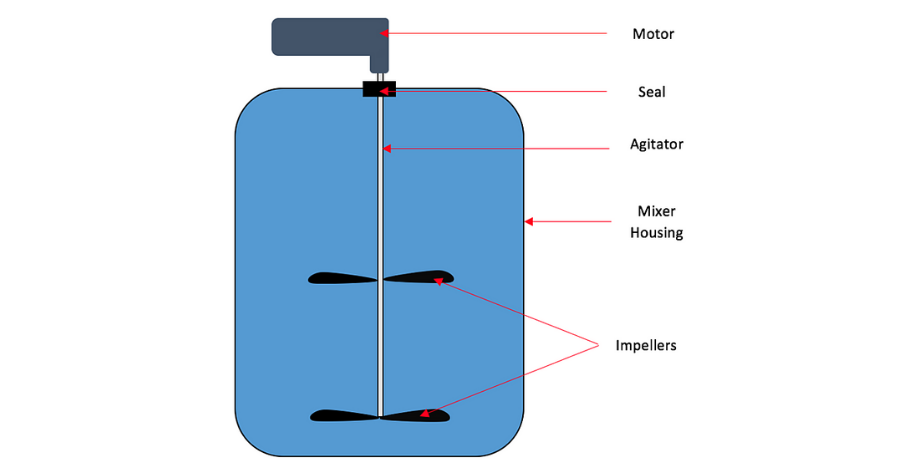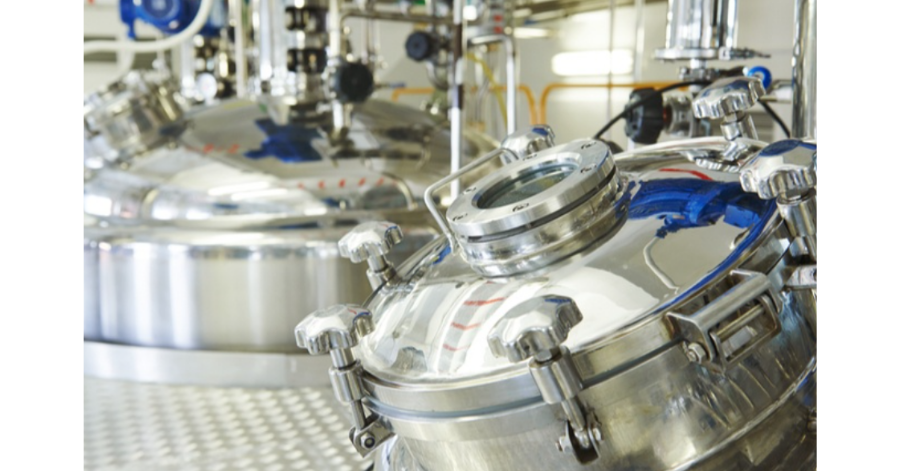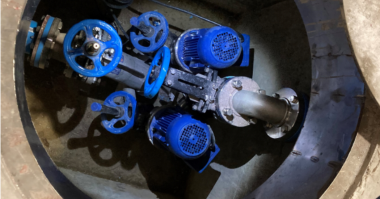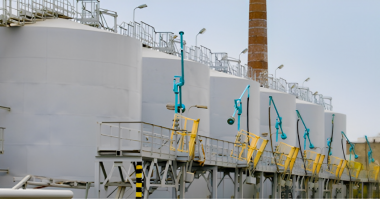Industrial mixers are an integral part of many pharmaceutical and food applications. Whether you are mixing animal feed on a large scale or dissolving polymers for use in medicine, mixers must be physically robust, as well as able to meet the FDA’s stringent health requirements and other pertinent regulatory agencies.
Carbon graphite has distinct advantages over alternate material types in hygienic applications, which is why it is the bearing and seal material of choice for many industrial mixer manufacturers:
- Mixers are often sealed off from the outside environment so that no foreign contaminants can enter the mixer housing.
- Industrial mixers frequently utilize carbon graphite mechanical seals to seal the clearance between the agitator shaft and the housing.
- Carbon graphite bearings are also used in these applications to support the agitator shaft.

Typical food/chemical mixers are sealed at the top of the mixing vessel. Carbon graphite seals are used to fill the clearance between the agitator shaft and the mixer housing. Carbon graphite wear rings and thrust bearings are used to secure the agitator shaft both axially and radially.
Why Carbon Graphite Seals/Bearings Perform Well For Food & Pharma
As they pertain to food and pharmaceutical mixers, carbon graphite seals/bearings are preferred over other materials for four main reasons:
1. Carbon Graphite Is Self-Lubricating
The layered molecular structure of carbon graphite allows for the material to easily “slide” over the counter face it runs against. As a result, there is no need for oil or grease lubrication in these designs. This is obviously critical for food and pharma applications, since the introduction of oil or grease into the process fluid poses serious health and contamination concerns. These mechanical seals and bearings are also able to run dry in case they are not directly exposed to any fluid during operation.
2. Impervious Carbon Graphite Grades Have No Porosity
Plain carbon graphite has an interconnected network of porosity that is a direct result of outgassing during the material manufacturing process. However, carbon graphite manufacturers are able to fill this porosity with various metals, resins, salts, etc. through a vacuum/pressure impregnation process. This process seals the porosity and makes it impossible for the process fluid to “seep into” the carbon graphite. The lack of porosity means that bacteria has no easy place to grow and the seal face can be easily cleaned & sanitized.
3. Carbon Graphite Is Maintenance-Free
Unlike most other bearing materials, carbon graphite does not need to have oil or grease frequently applied for lubrication. On top of this, the loads involved in most of these mixer applications are usually not so large as to cause excessive wear. As a result, carbon graphite bearings and mechanical seals do not need to be changed very often. This means one less task for maintenance teams to worry about!
4. Carbon Graphite Is Incredibly Chemically Resistant
Depending on the application, it is possible for your bearings and seals to be exposed to some fairly caustic process fluids. Thankfully, carbon graphite is an inert material. It is more than likely that there is a carbon grade which will work well in every application. For basic process fluids (pH > 6), copper or bronze impregnations are often used. For acidic applications (pH < 6), thermal setting resins or nickel chrome impregnations are usually used. In some of the most caustic applications, carbon graphite can actually be impregnated with carbon to produce one of the most chemically resistant carbon grades commercially available. The fact that a carbon impregnation is used in these applications is a clear testament to the inertness of carbon itself!
Trusted Material: Carbon Graphite Is Approved By The FDA
For many of the reasons described above, certain carbon graphite grades have gained approvals from governing authorities in the food & pharmaceutical sectors. The FDA has ruled that impervious carbon graphite articles are considered GRAS (generally recognized as safe) for use in food handling equipment.
There are also certain carbon grades that have passed the rigorous testing required to receive United States Pharmacopeia Class VI approval, which pertains to materials used as drug containers and prosthetic devices. On top of this, there are carbon graphite grades that are officially listed under the NSF-51 Standard for Food Equipment Materials, which is a standard that outlines the requirements for materials used in commercial food equipment.
Few other materials have the required physical properties and meet the rigid sanitary requirements for food & pharma applications. There are also few other materials that have been so well-tailored specifically for these applications.
In all likelihood, there is a carbon grade that is well-suited for your specific application.
Read more about the benefits of self-lubrication.





Comments